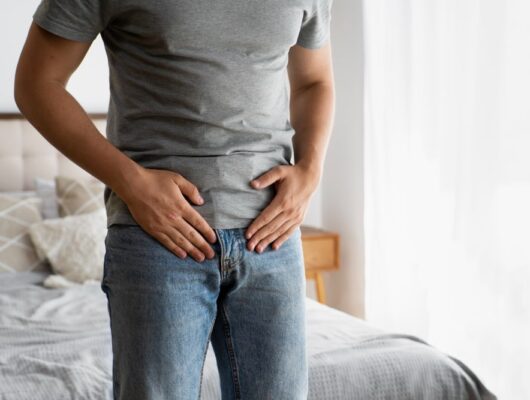Get Best Treatment for Fistula
Gut Care offers painless laser treatment for fistula. Affordable procedure by expert fistula doctor.
Around 26%-38% of Indian population is estimated to suffer from fistula.
Get 30 min laser treatment for fistula without surgery from our expert fistula doctors.
Book Appointment
Free 2nd Opinion
from Trusted Fistula Specialists
What is Fistula ?
According to Fistula Treatment Experts, Fistula-in-Ano is an abnormal opening on the buttocks, other than the natural opening. A small tunnel that develops between the end of the bowel and the skin near the anus (where poo leaves the body).
They’re usually the result of an infection near the anus causing a collection of pus (abscess) in the nearby tissue. When the pus drains away, it can leave a small channel behind.
Anal fistulas can cause unpleasant symptoms, such as discomfort and skin irritation, and will not usually get better on their own.
Symptoms of Fistula
- Skin irritation around the anus
- A constant, throbbing pain that may be worse when you sit down, move around, poo or cough
- Smelly discharge from near your anus
- Passing pus or blood when you poo
- Swelling and redness around your anus and a high temperature (fever) if you also have an abscess
- Difficulty controlling bowel movements (bowel incontinence) in some cases
Causes of Fistula
The leading causes of an anal fistula are clogged anal glands and anal abscesses. Other, much less common, conditions that can cause an anal fistula include:
- Crohn’s disease (an inflammatory disease of the intestine)
- Radiation (treatment for cancer)
- Trauma
- Sexually transmitted diseases
- Tuberculosis
- Diverticulitis (a disease in which small pouches form in the large intestine and become inflamed)
Cancer
Treatments for Fistula
- Non-surgical methods
- Fistulectomy: This is a surgical fistula treatment in which the fistula tract is completely cut out. With General anesthesia, the fistula tract is removed and the groove that is formed is left behind to heal.
Fistulectomy carries with the risk of damage to the sphincter muscle, resulting in fecal incontinence and is usually the treatment option for Complex types of fistula. - Fistulotomy: During the fistulotomy, your doctor will make an incision in your body to open up the abnormal connection between the two organs. This could potentially cause some complications following the surgery, including bowel incontinence (if the anus or rectum is involved), abscess or recurrence of the fistula.
- Seton thread (Ksharasutra) : Kshar Sutra for fistula is one of the best Ayurvedic treatments for fistula with a high success rate. Kshar Sutra is an ayurvedic para surgical therapy for the management of anorectal disorders.
- LIFT: LIFT(Ligation of Intersphincteric Fistula Tract) procedure is used for the treatment of Complex fistulas. Firstly, a seton is kept in the fistula tract, forcing it to widen over time. So after a few weeks, the surgeon removes the infected tissue and closes the internal fistula opening.
- FiLAC: The aim of FiLac(Fistula-tract Laser Closure) technique is to gently remove the fistula tract without damaging the sphincter muscle. The procedure makes use of Leonardo Laser. While the patient takes general anesthesia, the procedure is completed within 30 to 40 minutes.
- VAAFT: This technique is minimally invasive and sphincter-saving technique for treating complex fistulas.
A video telescope aides our expert fistula surgeons to see inside the fistula tract. A unipolar electrode for the internal tract. This connects to a high-frequency generator during this procedure. Also a fistula brush and forceps for cleaning the tract and clearing any granulation tissue.
At Gut Care, we deploy a combination of the world’s best options to give you the Best Fistula Treatment. In general, we employ a combination of Laser Therapy with the LIFT technique, which is the best result oriented therapy so far, that involves very fewer chances of recurrence.
And since these are minimally invasive techniques, there is absolutely no chance of sphincter/ valve damage leading to loss of bowel control.
Consult GutCare!
Dr Yuvrajsingh Gehlot

Ranjith HS
Wonderful gesture, had underwent fissure surgery. Instant relief after laser treatment. Doctor understanding and explanation

Satish Chandra
Thanks to the doctor, the visit has been very informative and eye-opening. They give free



